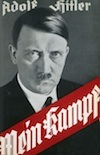 Culture & Ethics
Culture & Ethics
 Evolution
Evolution
Did Hitler Use the Term “Evolution” in Mein Kampf?
 Some critics of my scholarship have tried to argue that Hitler did not believe in human evolution at all, despite the overwhelming evidence I present in my book, Hitler’s Ethic: The Nazi Pursuit of Evolutionary Progress. Robert Richards even accuses me of playing a “sly trick” by translating the term “Entwicklung” as “evolution” in some passages of Mein Kampf. In the standard English translation of Mein Kampf (Houghton Mifflin’s edition), Ralph Manheim never translated “Entwicklung” as “evolution,” but always as “development.”
Some critics of my scholarship have tried to argue that Hitler did not believe in human evolution at all, despite the overwhelming evidence I present in my book, Hitler’s Ethic: The Nazi Pursuit of Evolutionary Progress. Robert Richards even accuses me of playing a “sly trick” by translating the term “Entwicklung” as “evolution” in some passages of Mein Kampf. In the standard English translation of Mein Kampf (Houghton Mifflin’s edition), Ralph Manheim never translated “Entwicklung” as “evolution,” but always as “development.”
I have already refuted Richards’s accusation here, but this summer I decided to consult other translations of Mein Kampf to find out how other translators handled the passages in dispute. I examined the following translations:
- Adolf Hitler, Mein Kampf, trans. Barrows Mussey (New York: Stackpole Sons, 1939)
- Adolf Hitler, Mein Kampf, trans. James Murphy (London: Hurst and Blackett, 1939)
- Adolf Hitler, Mein Kampf: The Official Nazi English Translation (n.p.: Elite Minds, 2009)
- Adolf Hitler, Mein Kampf, trans. Michael Ford (n.p.: Elite Minds, 2009)
- Adolf Hitler, The Racial Conception of the World, ed. Charles Grant Robertson (London: Friends of Europe, 1938) — this is a pamphlet with excerpts
Interestingly, I discovered that all these translators rendered “Entwicklung” as “evolution” in certain contexts, especially in the chapter on “Nation and Race.” The reason for this is rather obvious: In that chapter Hitler describes the struggle for existence among organisms as a natural process that improves the species. Sure sounds like evolution to me — and all these translators agree.
In any case, here are three brief passages from the Mussey translation (from the chapter “Nation and Race”), where Mussey translates “Entwicklung” as “evolution”:
The stronger must rule; it must not unite with the weaker, thus sacrificing its own stature. Only the born weakling can think this cruel, and that is why he is a weak and defective man; for if this law did not hold, any conceivable evolution of organic living things would be unthinkable. (p. 278)
Always struggle is a means to improve the health and stamina of the species, and thus a cause of its evolution.
By any other process all development and evolution would cease, and the very reverse would take place. (p. 278)
But little as Nature wishes a mating of weaker with stronger individuals, still less does she want the fusion of a higher with a lower race, since otherwise the whole labor of selective evolution, perhaps through thousands of years, would be set at naught. (p. 279)
The Murphy, Ford, and “official Nazi translation” (which was done largely by Murphy and resembles it closely) all use the term evolution in these passages, and Murphy is even more explicit about “Entwicklung” meaning biological evolution.
Murphy also uses the term evolution in a different passage of Mein Kampf:
Because everyone who believes in the higher evolution of living organisms must admit that every manifestation of the vital urge and struggle to live must have had a definite beginning in time and that one subject alone must have manifested it for the first time. (p. 249)
Robertson opened his pamphlet of excerpts from Mein Kampf with a section on “The Iron Law of Nature: Selection.” He began this section with the commentary:
The racial thought of Herr Hitler begins with a popularized conception of Darwin’s evolutionary hypotheses, which are turned to surprising uses. (p. 8)
Then he quoted from Mein Kampf:
The pre-requisite for improvement of the species lies not in the union of the superior and the inferior, but in the complete victory of the former. The stronger must dominate and not mix with the weaker, and thereby sacrifice its own greatness. Only the born weakling can feel this to be cruel. He is indeed but a weak and limited creature. If this law did not prevail, any higher evolution of all organic life would be unthinkable. (p. 8)
In sum, my translation of “Entwicklung” as “evolution” agrees with the usage of most translators of Mein Kampf. Richards’s claim that I am playing a “sly trick” falls to the ground.
